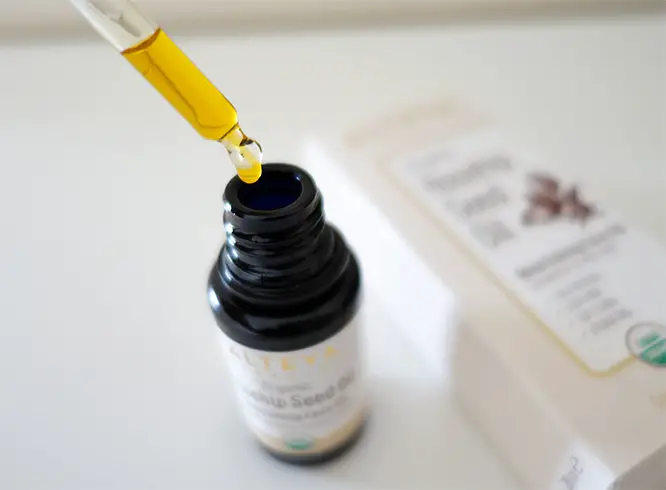Over the years, rosehip oil has been thought to help pregnancy-related skin conditions due to its healing and regenerating properties but is it truly safe for pregnancy?
When picking skin treatments during pregnancy, you need to be very careful as you do not want to apply anything to your skin that will hurt the baby.
If you already use this rich oil on your face and body and wonder whether or not to continue during your pregnancy, read on to discover everything you need to know about the safe use of rosehip oil during pregnancy.
Table of Contents
- Rosehip Oil Composition & Benefits
- Is Rosehip Oil Safe to Apply on the Skin During Pregnancy?
- Understanding Rosehip Oil and Vitamin A Safety During Pregnancy
- Harnessing the Power of Rosehip Oil Against Pregnancy Stretch Marks
- Using Rosehip Oil Safely During Pregnancy
- How to Buy the Best Rosehip Oil for Pregnancy

Rosehip Oil Composition & Benefits
Rosehip oil is a lightweight orange/amber oil obtained from the cold press of the rosehip seed of the dog rose plant. This nourishing oil contains several bioactive ingredients that give it unique skin-improving benefits. These include:
- Essential fatty acids: Its fatty acid profile is made up of linoleic, alpha-linolenic, and oleic acids that give it moisturizing properties. These essential fatty acids help strengthen the skin’s moisture barrier and reinforce its capacity to retain moisture.
- Antioxidants: This oil is packed with a bunch of phenolic compounds that give it potent antioxidant properties. It helps neutralize the effects of free radicals on the skin and prevent premature ageing.
- Vitamin E: Rosehip oil contains high amounts of vitamin E, an antioxidant that has anti-inflammatory properties. It is, therefore, ideal for soothing irritated skin. This study revealed that rosehip oil shows tremendous potential for the treatment of several inflammatory skin disorders.
- Pro-vitamin A: Rosehip oil has a high concentration of carotenoids (vitamin A derivative) which gives it skin regenerating and anti-ageing and skin brightening properties. It is very beneficial for people dealing with acne, uneven skin tone, and wrinkled skin.

Is Rosehip Oil Safe to Apply on the Skin During Pregnancy?
Although there is little scientific proof to support the benefits of applying rosehip oil to the skin during pregnancy, it is believed that this oil is safe for pregnant women.
Research shows rosehip oil can help with common pregnancy skin issues, like stretch marks, acne, eczema and dryness, thanks to its hydration and nourishment properties. Rich in fatty acids, antioxidants, and vitamin A, it helps keep skin elastic and supports its repair process.
However, as a precaution, some doctors suggest using rosehip oil sparingly or in low amounts during pregnancy, treating it as a supportive skincare treatment or a natural remedy. So, make sure you check with your doctor or naturopath before application.
Understanding Rosehip Oil and Vitamin A Safety During Pregnancy
Many pregnant women tend to be concerned about rosehip oil harming their unborn baby due to its high concentration of vitamin A. This fear is justified. Although important for the baby’s development, too much vitamin A intake by the mother could lead to birth defects in the baby. However, this is not the case with rosehip oil.
There exist two forms of vitamin A: preformed (retinol) and provitamin A (beta carotene and carotenoids).
Retinol is the active form of vitamin A. It is derived from animal food sources or synthesized supplements and is used directly by the body. High intakes of this form of vitamin A can cause side effects such as dizziness, nausea, headaches, and coma. In pregnant women, it could trigger birth defects in the babies.
Provitamin A, on the other hand, is a plant-derived form of vitamin A. When applied topically, the body converts it into retinol. The US National Institutes of Health established that a high intake of this form of vitamin A does not cause any of the side effects caused by the use of preformed vitamin A.
Rosehip oil is a rich source of carotenoids. As such, it is unlikely to cause any harm to an unborn child. Pregnant women should rather stay clear of cosmetic products that contain high doses of synthesized retinol to treat acne, scars, or signs of skin ageing.
Harnessing the Power of Rosehip Oil Against Pregnancy Stretch Marks
Up to 90% of pregnant women tend to be affected by stretch marks during and after pregnancy. To date, the cause of stretch marks is still unclear but that explains why no remedy has been found yet.
Just like acne, stretch marks have no cure and can only be managed. There exist several natural remedies, such as rosehip oil which help significantly improve this skin condition.
According to this 2013 study, a specific anti-stretch mark cream made with rosehip oil, Centella Asiatica, and vitamin E proved to be effective in reducing the severity, preventing the appearance, and stopping the progression of stretch marks during pregnancy.
Many pregnant women apply this oil on their bellies, not only to hydrate the skin but also to boost its elasticity. Rosehip oil also contributes to preventing the appearance of stretch marks. The provitamin A found in this oil helps fade stretch marks and regenerate skin cells for more firm skin.
Using Rosehip Oil Safely During Pregnancy
Incorporating rosehip oil into your pregnancy skincare routine can help manage stretch marks and keep your skin hydrated and elastic. Apply it twice daily, gently massaging it into areas prone to stretch marks. It’s best to start early in your pregnancy for optimal benefits.
If you have sensitive skin, test the oil on a small patch first to ensure no adverse reactions. Consistency is key, so regular use over weeks is necessary to see improvements. Always consult with your healthcare provider before adding new products to your skincare routine.
How to Buy the Best Rosehip Oil for Pregnancy
As a mother, you need to ensure that what you put on your body is safe for you and your unborn baby. With lots of versions available on the market, it can be tough to find the best quality.
Here are some pointers as to buying the best rosehip oil for your skin during pregnancy.
- As with all other plant oils, it is always best to buy pure, cold-pressed, unrefined, and undiluted rosehip oil. It reduces the risk of using oil that has been in contact with toxic solvents and guarantees the maximum nutrients are present in the oil.
- Colour and texture can also serve as indicators of the quality of your oil. Quality rosehip oil has a rich amber colour, a smooth feel, and thick consistency. A pale yellow colour indicates it has been diluted or heavily processed and will contain fewer nutrients.
- Unrefined Rosehip oil equally has a very distinctive smell which is hard to copy. If your oil smells like roses or flowers, it is an indication that a fragrance (chemical) was added to the product. It represents a risk of irritation.
- Make sure your oil is certified organic as it guarantees it was sustainably sourced and is chemical-free.
- High-quality rosehip oil comes in dark amber glass bottles that reduce sunlight exposure.
Related content:
Trilogy Organic Rosehip Oil Review
Alteya Organics Organic Rosehip Seed Oil Review
Bio-oil vs Rosehip Oil
Is rosehip oil safe while breastfeeding?

Petra Nakashian (previously Kravos) is a dedicated natural health and beauty blogger, driven by the loss of her parents to cancer, which led her to meticulously research beauty product ingredients. With over 10 years of experience, her in-depth knowledge has made her a trusted expert in the field. Founder of Be Healthy Now and Green Beauty Talk, Petra recently expanded her expertise with Beauty Insights Hub, exploring a wider range of beauty treatments. Committed to transparency and honesty, her work is a vital resource for navigating the complex world of beauty.

